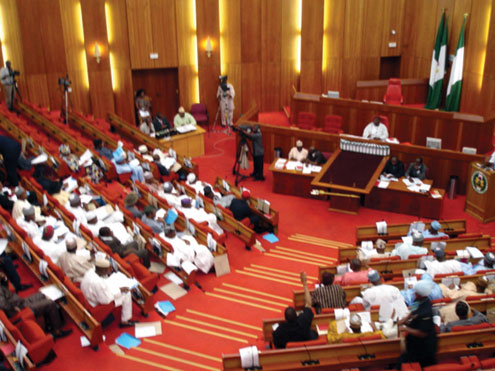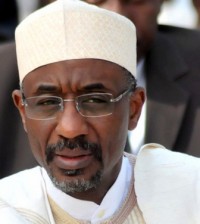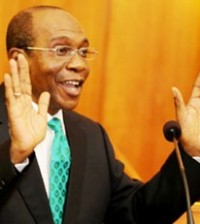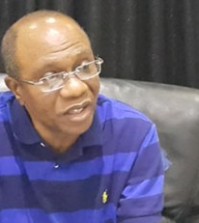CBN to introduce Biometric ATM cards to check fraud
To check ATM frauds, the Central Bank of Nigeria (CBN) is set to introduce biometric ATMs in the country.
Answering questions from journalists at the end of the Monetary Policy Committee meeting in Abuja yesterday, the CBN Governor Mallam Sanusi Lamido Sanusi disclosed that “the Deputy Governor, Operations is looking at the possibility of biometric ATMs standards to reduce ATM frauds in the market”.
This, he said, is coming on the heels of a recent refund of over N2 billion to bank customers who were victims of ATMs frauds.
According to the CBN governor, “one of the departments is doing an analysis to give a report to the Committee of Governors on what to do”.
Another issue, he spoke on is the impending mergers/ acquisitions of the troubled banks. He revealed that “on the MoUs, the first announcement will be made on Thursday (today), the second will be made on Monday, next week and the third will be made on Wednesday next week”.
To know the banks and their partners, he said the MoUs would not be final merger or acquisition documents,. Rather, that they would be state of the banks and their parties and that there would be shareholders and regulatory approvals before the deals were finalised.
On the state of the economy, the CBN governor said from the GDP’s growth perspective, it is doing very well but that there was room for improvement.
Sanusi noted that the economy was doing well in some areas but there was the need for improvement on other aspects of the economy.
The economy, he insisted, was growing rapidly particularly in agriculture, retail trade, services, particularly telecoms.
The CBN maintained that the economic growth recorded was not inclusive, arguing that Nigeria needs “to have a growth that affects more people and that translates to eradication of poverty”.
The constraints to the economic growth that needs to be addressed are the infrastructure deficit, but the on-going power reforms, “the work being done by the Infrastructure Concession Regulatory Commission (ICRC), he said, should help fix the infrastructure problem”.
He added: “What we try to do is direct credit, help access to finance for power; for infrastructure, what we consider to be the critical sectors of the economy and their linkages”.
According to the CBN governor, “we should be able to have a more inclusive growth, but certainly, we can improve on the management of the fiscals’position of government, reduce the amount of recurrent expenditure, and increase capital expenditure”.
The CBN governor also spoke on the controversy between the apex and the International Monetary Fund (IMF) over the devaluation of the naira.
He said: “If there is a very strong demand for dollars, maintaining exchange rate stability comes at the cost of reducing reserves, but underlying that assumption is that one can build reserves without the cost because the decision to build up reserves and not keep a stable currency has implications. If the naira depreciates, you have increased costs of imports, you have increased food costs and you have increased unemployment.
‘So, the choices that Nigeria make does not come from that which has to come where there is no cost. It’s a decision that weighs the costs and benefits of both options. If we can keep a stable exchange rate and keep building reserves,that is what we will like. But if someone tells you, ‘don’t defend the naira, let the naira depreciates, so that you build up foreign reserves, he is at the same time telling you to let domestic prices go up, to let manufacturers suffer and to let workers on the street”.
He described the position of the CBN as ideological, arguing: “the difference is that I am open that I admit I am taking a position in the interest of the economy, and those who are acting in the interest of international finance capital are not honest enough and they pretend it is an economic and objective truth, there is no objective truth in this.
“All knowledge and truth is constructed within paradigms and I am very open about my paradigms here as Central Bank of Nigeria governor and I think that my policy should be to promote employment, they should improve the living standards of the people, and they should protect jobs.
‘’As long as I am here, as the CBN governor, we will continue to defend the naira if we have the foreign exchange to do it, if it becomes impossible we have no choice but if we can afford to and now we can, with high oil price and output we will defend the naira”.
The CBN governor denied that the naira was in a fixed exchange rate regime, stressing that “we were at N128 to the dollar in 2008 and by 2009 the naira lost 27% of its value and lost more value in 2010. We would consider if the fundamentals justifies it, our view at this moment is that when oil prices are rising, when outputs are rising, any excess demand is not driven by fundamentals, it is therefore temporary”.
Some of the concerns for a devalued naira he attributed to concerns in the coming elections, according to Sanusi, “people are worried about elections in African countries, you know what happened in Ivory Coast and Benin some of it is because people erroneously believe that there will be a devaluation after the elections”,
To show the CBN’s commitment to exchange rate stability Sanusi maintained that the CBN has “started the forwards market that is enough evidence of our commitments to exchange rate stability because we would not be selling forwards if we felt we were going to devalue, we are able to maintain a stable exchange rate even when we increase the supply and still build up the reserves so our position is that given the fact that a weaker naira translates to higher inflation especially in the wake of rising food and energy crisis a stable exchange rate is one of the tools that we need to have to maintain exchange rate stability, we would consider but it is not on the table”.
On interest and savings account palaver which many banks have found themselves in, Sanusi said the CBN has “made it clear that we think there is need to compensate savers and depositors in order to reduce the risk of intermediation, even if we were to come up with a minimum rate on savings at the time that we have guaranteed interbank rates what is the likelihood for success at this point in time people might just decide to retain deposits when they know that they can always take money from the interbank with a CBN guarantee.
Still in defence of the banks any such policy he said “is more likely to be effective in a market that does not have the distortions of a guarantee. So sorting out the banks and fixing them and getting out of the guarantee so that banks are standing on their feet, and then having banks compete for deposits is what will lead to the new rates of interest as much as possible we will use the market and direct the market but we want to make sure that we don’t announce a policy that will not be effective” he said.
With regards to funding the real sector, the CBN governor noted that “you can fix the balance sheet of banks and that fixes the supply side for credit but what is important is for the CBN to work with other organs of government to unlock the demand side”.
He insisted that “if u want a bank to lend to a tomato farm u have to fix the issues of storage and handling of a perishable product. If 50% or 60 % of the produce is lost between the farm and the market that farm can never be commercially viable enough to borrow from the banks so we are working with our colleagues in government and we are trying to have the right policies and incentives for other forms of investments to unlock the value chain, we need to move from primary production to higher value generating areas in the value chain for agriculture to be commercially viable”.
Another sour point for the weak lending to real sector he said lack of access to the market. Nigeria he said does not “have marketing boards we don’t have standards, the commodities board in Abuja is not working, it is not easy for example for a man seating in London, to establish an LC to import cotton from Nigeria because there are no standards but they can do it in Cameroon and Chad. So it is very easy to blame the banks for not lending to real sector, but you have to have the right policies to make viable counter parties available to the banks”.
Source : The Nation








